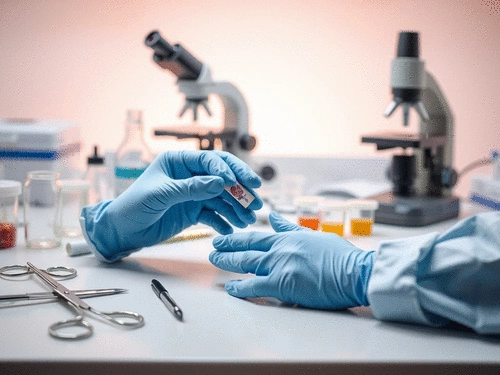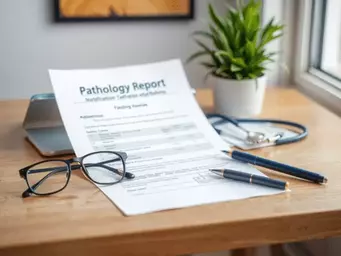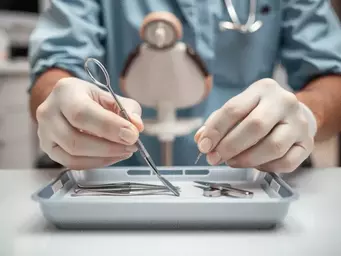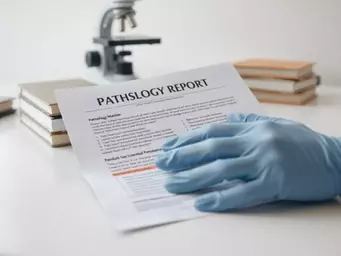When it comes to understanding medical procedures, knowledge is power. The more you learn about biopsies, the more confident you can feel as you navigate this important step in your healthcare journey.
What You Will Learn
- Biopsies significantly enhance diagnostic accuracy, enabling doctors to confirm or rule out diseases.
- Understanding common reasons for biopsies, such as investigating abnormal findings, can help alleviate patient anxiety.
- Being aware of preparation tips, like wearing comfortable clothing and arranging transportation, can make the experience smoother.
- Discussing risks and potential side effects with your healthcare provider can provide peace of mind before the procedure.
- Informed consent is crucial; understanding the procedure and asking questions empowers you as a patient.
- Post-biopsy care is essential, including following recovery instructions and scheduling follow-up appointments to discuss results.
The Biopsy Process: Key Stages and Patient Experience
Understanding the common reasons for biopsies, the preparation involved, and what to expect post-procedure can significantly reduce anxiety. Here's a visual overview of the journey.
Common Reasons for Biopsy
- Investigating Abnormal Findings
- Assessing Tumors (Benign/Malignant)
- Understanding Infections
- Evaluating Inflammatory Conditions
Biopsy Preparation Checklist
- Review dietary restrictions
- Arrange for transportation
- Wear comfortable clothing
- Gather personal post-procedure items
Risks & Side Effects
- Minor Bleeding
- Slight chance of Infection
- Mild Discomfort/Pain
- Allergic Reactions (rare)
Post-Biopsy Care & Follow-Up
- Allow time to Rest
- Follow specific care instructions
- Schedule follow-up appointments
- Review pathology results
Understanding Biopsy: Importance and Overview
When we talk about a biopsy, it's essential to recognize its significance in the realm of medical diagnostics. A biopsy involves taking a small sample of tissue from the body to be examined under a microscope. This process can provide crucial insights into whether a particular area is healthy or if there are underlying issues, such as cancer or infections.
By understanding the intricacies of biopsies, patients can approach this procedure with more confidence and less anxiety. At What Is A Biopsy, we aim to demystify these processes, ensuring you feel empowered to make informed healthcare choices!
Defining Biopsy and Its Role in Medical Diagnosis
At its core, a biopsy is a diagnostic procedure that helps doctors determine the nature of abnormal tissues. It plays a vital role in confirming or ruling out diseases, particularly malignancies. The tissue sample obtained during a biopsy is then processed and examined by a pathologist, like myself, to provide a definitive diagnosis.
- Diagnostic Accuracy: Biopsies enhance the accuracy of diagnosing conditions.
- Guiding Treatment: The results inform treatment strategies tailored to individual patient needs.
- Monitoring Diseases: Biopsies can help monitor the progression of diseases over time.
So, whether you’re facing a stress-inducing procedure or just seeking clarity, remember that biopsies are your medical team’s tool for uncovering the truth about your health.
Common Reasons for Performing Biopsies
There are several reasons why a healthcare provider may recommend a biopsy. Understanding these can alleviate the concerns surrounding why you might need one. Here are some common reasons:
- Investigating Abnormal Findings: If imaging tests or physical exams reveal something unusual.
- Assessing Tumors: To determine if a tumor is benign or malignant.
- Understanding Infections: To identify infections that may not be clear from other tests.
- Evaluating Inflammatory Conditions: To confirm autoimmune diseases or other inflammatory disorders.
By recognizing these common scenarios, patients can feel more at ease with the prospect of undergoing a biopsy. It’s just one step towards maintaining your health!
We Want to Hear From You!
What are your main concerns when preparing for a biopsy? Share your thoughts below:
Addressing Common Patient Concerns About Biopsy Preparation
When it comes to preparing for a biopsy, it's completely natural to have questions and concerns. At What Is A Biopsy, we believe that understanding the process can significantly reduce anxiety. In this section, we aim to address the most common questions patients have regarding biopsy preparation, ensuring you're informed and comfortable as you approach your procedure!
Frequently Asked Questions on Biopsy Preparation
One of the best ways to alleviate concerns is to look at the frequently asked questions. Here are some common queries:
- What should I wear on the day of my biopsy? Comfortable clothing is recommended, as it can make the experience much more pleasant.
- Can I eat or drink before my biopsy? This depends on the type of biopsy you're having—some require fasting.
- How long will the procedure take? Most biopsies are quick, often taking less than an hour.
- Will I need someone to drive me home? Depending on the anesthesia used, you may need a ride home.
Don't hesitate to jot down your own questions as they come to mind. Remember, clarity fosters confidence!
Understanding Risks and Potential Side Effects
While biopsies are generally safe, it's essential to understand that, like any medical procedure, they come with some risks. Here are some common risks associated with biopsies:
- Bleeding: Minor bleeding at the biopsy site is common.
- Infection: There's always a slight chance of infection, but this can often be managed effectively.
- Pain: Mild discomfort is expected, but severe pain should be reported to your healthcare provider.
- Allergic reactions: Some patients may react to anesthesia or medications used during the procedure.
It's vital to discuss these risks with your healthcare team. They can provide insights tailored to your specific health circumstances, which can be reassuring!
Informed Consent: What You Need to Know Before a Biopsy
Informed consent is a crucial aspect of the biopsy process. It ensures that you fully understand the procedure and its implications. Here's what you can expect:
- Explanation of the procedure: Your doctor will explain how the biopsy will be performed.
- Potential risks: You'll be informed about the risks and side effects, allowing you to make an informed choice.
- Alternatives: You'll learn about any alternative options that may be available for diagnosis.
- Questions and clarifications: This is your opportunity to ask questions to ensure you feel comfortable with the decision.
Taking the time to understand and discuss these elements can empower you as a patient. Remember, at What Is A Biopsy, we’re here to help you navigate this journey with clarity and confidence!
Frequently Asked Questions about Biopsies
What is a biopsy and why is it important?
A biopsy is a medical procedure where a small tissue sample is taken from the body for examination under a microscope. It is crucial for diagnostic accuracy, helping doctors confirm or rule out diseases like cancer, and guiding appropriate treatment plans.
What are the common reasons a doctor might recommend a biopsy?
Doctors typically recommend biopsies to investigate abnormal findings from imaging tests or physical exams, assess the nature of tumors (whether benign or malignant), identify infections that are not clear from other tests, and evaluate inflammatory conditions or autoimmune diseases.
How should I prepare for a biopsy?
Preparation tips include reviewing any dietary restrictions with your healthcare provider, arranging for transportation if necessary (especially if sedation is involved), wearing comfortable clothing, and gathering personal post-procedure items like pain relievers or ice packs.
What are the potential risks and side effects of a biopsy?
While generally safe, common risks include minor bleeding at the biopsy site, a slight chance of infection, and mild discomfort or pain. Allergic reactions to anesthesia or medications are rare but possible. It's important to discuss these with your healthcare team.
What is informed consent and why is it important before a biopsy?
Informed consent is a process where your doctor explains the biopsy procedure, its potential risks and side effects, and any alternative diagnostic options. It's crucial because it ensures you fully understand and agree to the procedure, empowering you to make an informed healthcare decision and ask any questions you may have.
Summarizing Key Points for Effective Biopsy Preparation
As you approach your biopsy, having a clear outline of what you need to prepare can make all the difference. In this section, we’ll summarize the key points to ensure you’re ready and informed.
Checklist for Biopsy Preparation: What You Should Review
Having a checklist can alleviate a lot of stress. Here’s a handy guide to help you prepare:
- Review any dietary restrictions provided by your healthcare provider.
- Arrange for transportation if necessary.
- Wear comfortable clothing on the day of your biopsy.
- Gather any personal items you may need post-procedure, like pain relievers or ice packs.
With this checklist in hand, you can focus on what truly matters—your health!
Next Steps Post-Biopsy: Care and Follow-Up
Once your biopsy is completed, understanding the next steps is crucial. This typically includes:
- Rest: Allow yourself time to recover after the procedure.
- Care instructions: Follow any specific post-biopsy care instructions from your healthcare provider.
- Follow-up appointment: Schedule any necessary follow-ups to discuss your results.
Being informed about post-biopsy care can ensure a smoother recovery process!
Encouraging Open Communication with Healthcare Providers
Communication is key in any healthcare journey. Here are ways to foster open dialogue:
- Ask questions: Don’t hesitate to voice your concerns or uncertainties.
- Provide feedback: Share your experiences, especially if something feels off during recovery.
- Request clarification: If something isn’t clear, ask for more information!
At What Is A Biopsy, we encourage you to be an active participant in your healthcare. Remember, your comfort and understanding are paramount!
Understanding Biopsy Results: What Pathology Reports Reveal
After your biopsy, you will receive pathology results that provide valuable insights. Here's what to look for:
- Diagnosis: This indicates whether any abnormal cells were found.
- Type of cells: Understanding what type of cells were sampled can guide further treatment.
- Recommendations: The report may include suggestions for follow-up actions or additional tests.
Having a grasp on how to interpret these results can empower you to discuss further steps confidently with your healthcare team.
Recap of Key Points
Here is a quick recap of the important points discussed in the article:
- Understanding Biopsy: A biopsy involves taking a tissue sample to diagnose health issues, including cancer.
- Common Reasons for Biopsies: Biopsies are performed to investigate abnormal findings, assess tumors, identify infections, and evaluate inflammatory conditions.
- Preparation Tips: Follow dietary restrictions, wear comfortable clothing, and arrange transportation if needed.
- Post-Biopsy Care: Rest, follow care instructions, and schedule follow-up appointments to discuss results.
- Open Communication: Encourage dialogue with healthcare providers by asking questions and providing feedback.









